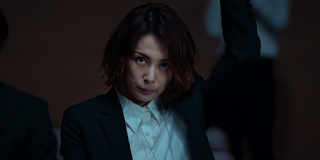Tiger Cage; or, Between a Rock and a Hard Place
We bachelors really envy your true feelings. You're lucky, you're quitting tomorrow.
Tiger Cage is a trilogy of films made by Yuen Woo-ping between 1988 and 1991 which focus on the hard life of Hong Kong cops who solve criminal cases. The first movie in the series is a hard-edged thriller with an excellent cast and explosive action.
We bachelors really envy your true feelings. You're lucky, you're quitting tomorrow.
Tiger Cage is a trilogy of films made by Yuen Woo-ping between 1988 and 1991 which focus on the hard life of Hong Kong cops who solve criminal cases. The first movie in the series is a hard-edged thriller with an excellent cast and explosive action.
Release Info
Directed by: Yuen Woo-ping Starring: Jacky Cheung, Simon Yam, Donnie Yen, Carol Cheng
Language: Cantonese Original Title: 特警屠龍 Runtime: 92 min
Synopsis
Officer Hsiu (Leung Kar-Yan) together with his anti-narcotics team raid the smuggling den. The policeman is chasing a bad guy (Johnny Wang) during the raid. The mobster is presumably shot dead, but he actually survives and takes his revenge on Hsiu by killing him. Shirley (Carol Dodo Cheng) who was about to marry Hsiu finds it hard to get over the loss of her fiancé. She is consoled by Inspector Wong (Simon Yam). In the meantime, two officers, Fan Chun-yau (Jacky Cheung) and Terry (Donnie Yen) discover that their partner, Uncle Tat (Ng Man-Tat) actually cooperates with drug dealers. When they present the evidence to Inspector Wong, they unknowingly put themselves in danger…
Officer Hsiu (Leung Kar-Yan) together with his anti-narcotics team raid the smuggling den. The policeman is chasing a bad guy (Johnny Wang) during the raid. The mobster is presumably shot dead, but he actually survives and takes his revenge on Hsiu by killing him. Shirley (Carol Dodo Cheng) who was about to marry Hsiu finds it hard to get over the loss of her fiancé. She is consoled by Inspector Wong (Simon Yam). In the meantime, two officers, Fan Chun-yau (Jacky Cheung) and Terry (Donnie Yen) discover that their partner, Uncle Tat (Ng Man-Tat) actually cooperates with drug dealers. When they present the evidence to Inspector Wong, they unknowingly put themselves in danger…
Upholding the Law
Tiger Cage seems like a prelude to Yuen Woo-ping's other classic action film In the Line of Duty IV (1989). Indeed, action set pieces are exhilarating and Donnie Yen appears as the righteous cop. (Un)surprisingly his character is killed off early on in the picture, mostly due to the fact that Donnie was not then as popular as Jacky Cheung who is the real leading man.
Tiger Cage seems like a prelude to Yuen Woo-ping's other classic action film In the Line of Duty IV (1989). Indeed, action set pieces are exhilarating and Donnie Yen appears as the righteous cop. (Un)surprisingly his character is killed off early on in the picture, mostly due to the fact that Donnie was not then as popular as Jacky Cheung who is the real leading man.
Great cast and excellent fight sequences are indeed the main advantages of Tiger Cage. It is a pleasure to see Donnie Yen facing off against Michael Woods and Jacky Cheung battling the intimidating Simon Yam. Interestingly, Carol Cheng (during pre-Her Fatal Ways days) shines in the film, in spite of having small screen time. Also, Ng Man-Tat has a lot of stuff to do in the movie, contrary to being just a comic relief as in his many other roles from the 1990s.
The only disadvantage of Tiger Cage, I would say, is the film’s tendency to crank up that aspect of uncomfortability to the max in certain scenes. For instance, the death scene of the character played by the graceful Irene Wan is too harrowing and too out of the blue. In contrast, Uncle Tat is the story’s main punching bag, but he survives every ordeal.
A word of caution: if you expect to see traditional sequels, it is best to say out-front that Tiger Cage 2 and Tiger Cage 3 are completely unrelated to the original film, even though some of the cast members (Donnie Yen and Carol Cheng) return in new roles. The follow-ups present completely independent storylines.
Recommendations
That being said, I admit that Tiger Cage is a pleasant viewing. If you like the cops vs. bandits spectacles , then I recommend the film. In addition, the 1980s vibes and suave Simon Yam as well as Jacky Cheung on the edge are awesome bonuses. Gotta love classic Hong Kong productions.
That being said, I admit that Tiger Cage is a pleasant viewing. If you like the cops vs. bandits spectacles , then I recommend the film. In addition, the 1980s vibes and suave Simon Yam as well as Jacky Cheung on the edge are awesome bonuses. Gotta love classic Hong Kong productions.
«Enjoyed this post? Never miss out on future posts by following us»













-1200-1200-675-675-crop-000000.jpg)























